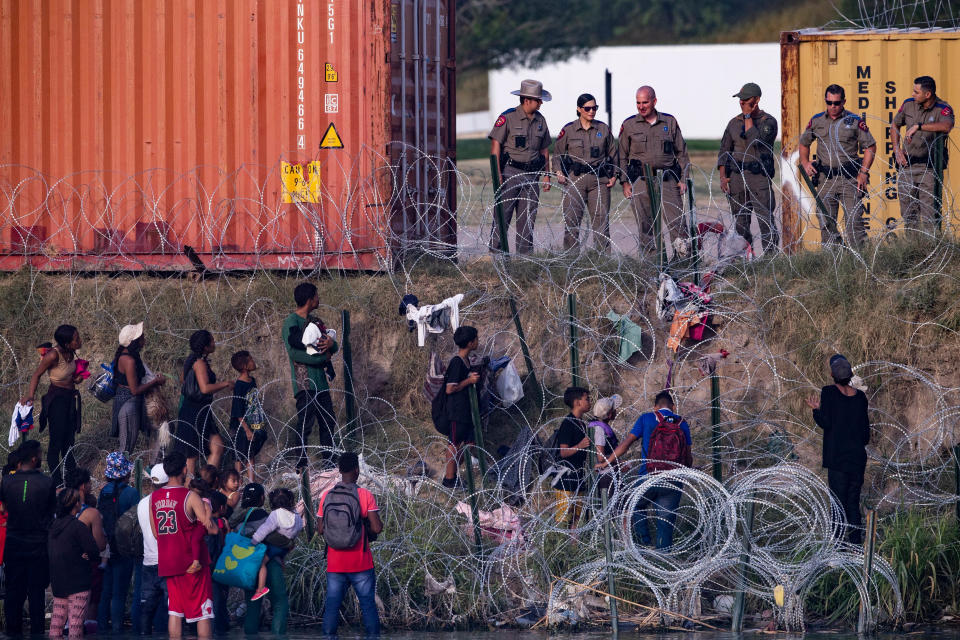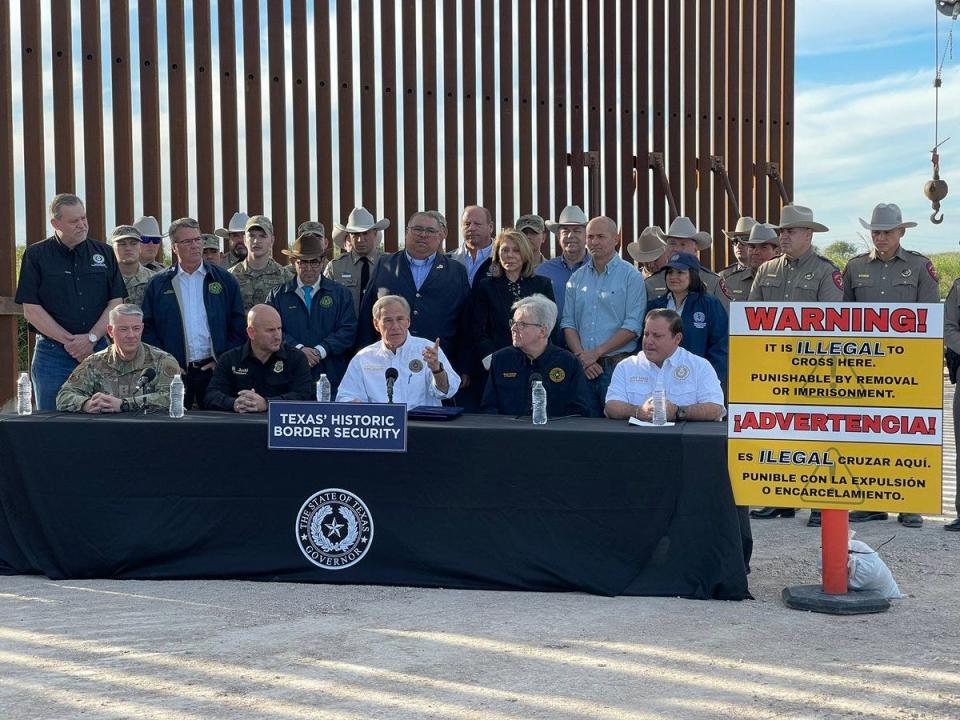New Texas law cracking down on illegal immigration sparks comparisons to Arizona's SB 1070
- Oops!Something went wrong.Please try again later.
A new Texas law makes it a state crime to cross the Texas-Mexico border illegally or to be in the state without authorization.
It has been dubbed the "show me your papers" law, sparking similarities to Senate Bill 1070, the infamous Arizona law signed in 2010, which at the time was considered one of the strictest anti-immigrant laws in the country.
Implementation of Texas' Senate Bill 4 is slated to begin in March. But the legislation already faces challenges in court.
There are some similarities between the Arizona and the Texas laws, such as the state crime provisions. But Senate Bill 4 goes further because it enables state officials to remove detained migrants to Mexico.
The Texas law has been heavily criticized and likely will continue to face the same type of scrutiny as Senate Bill 1070 did in its time.
Here are ways the two controversial laws are alike, and how they differ.
Criminalizing illegal entries at the state level
Both Senate Bill 1070 in Arizona and Senate Bill 4 in Texas make it a state misdemeanor to be in the state without authorization.
In Arizona, the law criminalized at the state level not carrying documentation proving lawful status in the country. It also criminalized working without federal authorization to do so and stopping traffic to pick up or hire day laborers.
The law also allowed police to make arrests without warrants under certain circumstances, and to check the immigration status of people if they had "reasonable suspicion" that they were in the country illegally.

Similarly, the Texas law makes it a state misdemeanor to cross the Texas-Mexico border illegally in between the ports of entry and allows state officials to arrest anyone they suspect of crossing the border without authorization. It also would require local law enforcement agencies throughout the state to begin holding in their facilities the migrants charged under this law while they are prosecuted.
Both laws were enacted under Republican-led governments who blamed the federal government for not doing enough on border security.
In Arizona, it was the culmination of an "attrition through enforcement" campaign in the 2000s led by the state Legislature that sought to make life for undocumented immigrants so tough they would opt to self-deport. It came at a time when Arizona was by far the busiest corridor for migrants crossing the border.
"The bill I’m about to sign into law — Senate Bill 1070 — represents another tool for our state to use as we work to solve a crisis that we did not create and the federal government has refused to fix," Arizona's then-Gov. Jan Brewer said when she signed the law in April 2010.
Texas Gov. Greg Abbott has taken up this mantle in recent years, accusing the federal government of abdicating its responsibilities along the border. In 2021, he launched Operation Lone Star to crack down on illegal immigration.

Senate Bill 4 is one of three laws he signed in December. The two others will set aside $1.5 billion to build additional barriers along the Texas border and will stiffen penalties for smuggling and operating stash houses in the state.
"President (Joe) Biden’s deliberate inaction has left Texas to fend for itself," Abbott said Dec. 18, when he signed the bill into law.
Senate Bill 4 has raised concerns from migrant and human rights advocates about the potential for racial profiling and having U.S. citizens and lawful residents caught up in its enforcement, mirroring concerns about SB 1070 in Arizona more than a decade ago.
"As was true then, this new law will obviously lead to racial profiling of U.S. Citizens and residents. Attempting to enshrine this sort of fearmongering and hatred into law for political gain is petty and opportunistic," the American Immigration Lawyers Association said in a statement after Abbott signed the law.
Texas law takes enforcement a step further
Though SB 1070 was considered the strictest, harshest anti-immigrant measure of its time, it since has become a model for legislation in other states. However, the Texas law goes further in that it empowers state officials to carry out some duties that until now have been solely under the purview of federal immigration officials.
Senate Bill 4 allows state deputies to arrest and prosecute migrants under state law for illegal entry and illegal re-entry, mirroring federal legislation. But the law also permits magistrate judges in the state to dismiss the charges if migrants agree to be sent back to Mexico. Additionally, the law grants civil immunity and indemnification to local and state officials and contractors for any "damages" that could come up from enforcing the new law.
The Texas law does carve out exemptions for enforcement, prohibiting arrests in K-12 schools, religious places of worship, health care facilities or other facilities that provide forensic medical services to sexual assault survivors.
Podcasts on SB 1070: Listen to the full season of 'Rediscovering: SB 1070'
SB 1070 could impact enforcement of the Texas law
Although it is not a copycat law, the future of Senate Bill 4 in Texas could be closely linked to the outcomes of SB 1070. Some things they also share in common are court challenges against some of their key provisions.
The American Civil Liberties Union and the Texas Civil Rights Project filed a lawsuit the day after Abbott signed Senate Bill 4 into law, on behalf of El Paso County and two immigrant advocacy organizations in Texas. They argue the law is unconstitutional because it usurps the federal government's authority in enforcing immigration laws.
“This law blatantly disregards people’s right to due process and will allow Texas law enforcement to funnel family, friends, and loved ones into the deportation pipeline," Rochelle Garza, president of the Texas Civil Rights Project, said in a statement. "Texas does not have the power to implement its own immigration laws."
The same argument was used to successfully strike down most of the immigration provisions of SB 1070 in Arizona.
In July 2010, weeks before the law was scheduled to take effect, the U.S. Department of Justice filed a lawsuit against SB 1070. A federal court issued a preliminary injunction halting the implementation of parts of the law. The case, United States v. Arizona, made its way to the Supreme Court.
In June 2012, the high court struck down, in a 5-3 ruling, the provisions in SB 1070 that made it a state crime to carry proof of lawful status, to work without federal authorization and to arrest certain immigrants without a warrant. Justices upheld the supremacy clause of the U.S. Constitution, which delegates the authority to enforce immigration laws solely to the federal government.
Subsequent lawsuits against the Arizona law succeeded in striking down additional provisions, including those against hiring day laborers or denying bonds to undocumented immigrants.
In 2016, the Arizona attorney general reached a settlement with immigrant advocacy organizations on the remaining portion, which required state and local law enforcement to investigate the immigration status of any people they came in contact with if authorities had "reasonable suspicion" that they were in the country illegally. Under the agreement, the attorney general issued an informal opinion that immigration status could not be used as the sole reason to arrest or detain someone.
The Supreme Court's 2012 decision, in particular, could play a major role in determining the future of Texas Senate Bill 4. But if the case makes it up to the Supreme Court, Texas officials could find a more receptive response in the now conservative-majority court.
Justices Clarence Thomas and Samuel Alito would have upheld most or all the provisions in the Arizona law in 2012. Since then, three other conservative justices who have joined the court have shown an openness to overturning precedents and limiting the role of the federal government.
Outside of the U.S. court system, Arizona also faced nationwide backlash and was the target of boycotts after SB 1070 became law. Protests around the country drew thousands of people.
Politically, the law and its lingering effects began to move Arizona's orientation toward the center, paving the way for its recent status as a battleground state.
In the year after SB 1070 passed, the law's main architect, former state Senate President Russell Pearce, was ousted from office in a historic recall election. Since then, Arizona lawmakers have not passed a single anti-immigrant bill.
SB 1070 also created backlash within the state's growing Latino community, empowering community leaders who have since stepped up to local and statewide offices.
The activism that surged during this time has also driven changes to state laws. Last November, Arizona voters partially repealed a 2006 anti-immigrant measure that also was championed by Pearce and granted undocumented students in-state tuition and access to state financial aid.
Have any news tips or story ideas about immigration in the Southwest? Reach the reporter at rafael.carranza@arizonarepublic.com, or follow him on X (formerly Twitter): @RafaelCarranza.
This article originally appeared on Arizona Republic: Senate Bill 4 in Texas sparks comparisons to Arizona's famous SB 1070

